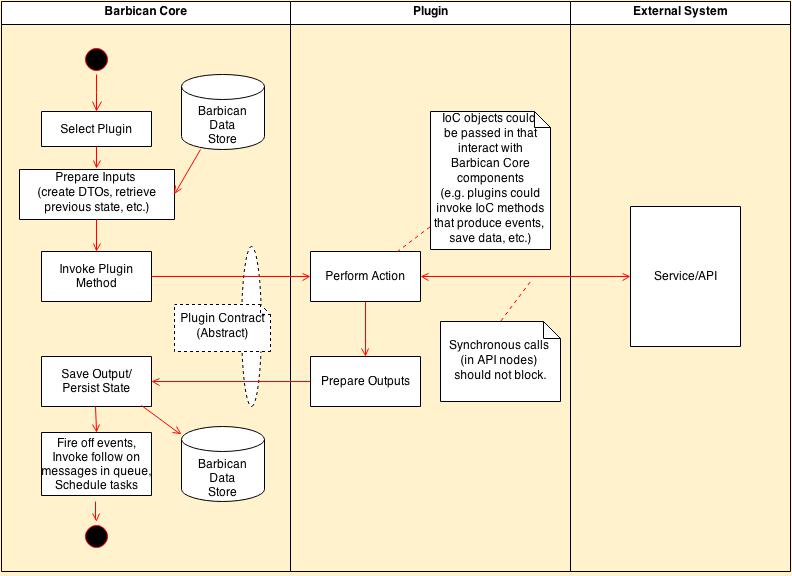Difference between revisions of "Barbican/Discussion-Plugin-Design"
(Add async order section.) |
m (Added details for the aynch order section.) |
||
| Line 19: | Line 19: | ||
== Asynchronous Order Processing Plugins == | == Asynchronous Order Processing Plugins == | ||
| − | The Overview section detailed Barbican plugin flows. This section adds more detail for asynchronous order process flows. | + | The Overview section detailed Barbican plugin flows. This section adds more detail for asynchronous order process flows, especially for [[Barbican/Blueprints/ssl-certificates|SSL certification generation involving interacting with a certification authority (CA)]]. The following figure depicts asynchronous processing by the Barbican Core worker process, invoked via RPC calls from the oslo.messaging queue service. |
| + | |||
| + | |||
| + | For SSL certification generation, more than one vendor plugin may be available such as for Dogtag or Symantec, hence the order's details should include which vendor to use for the selection criteria, or else Barbican should support specifying a default vendor/plugin to use. | ||
| + | |||
| + | Barbican would then need to retrieve any state associated with a given order instance, probably via order meta data information stored along with the order record. The plugin could define this status as key/value pairs for example. Since the same plugin may be called multiple times for the same order instance, this persisted state might include a state machine state name. If the order instance needs to 'link' to an external system's order reference (such as for Symantec) this could be stored in the meta data as well (as determined by the plugin). | ||
Revision as of 22:36, 4 May 2014
Contents
This page explores design concepts for Barbican plugin interfaces. Barbican currently uses plugins to interface with cryptographic resources such as hardware security modules (HSMs). This page also discusses how the plugin approach could accommodate the planned addition of SSL certificate generation and management to the orders resource.
Overview
The following figure depicts a generic plugin dataflow within Barbican. Note the separation of 'core' Barbican functionality (available in the main Barbican repository and representing work done on behalf of plugins) from 'plugin' functionality to perform some type of work, which might include interaction with external services. The source code for these 'plugins' may or may not be available in the Barbican code base.
Focusing on Barbican Core, a plugin must be selectable from more than one potential implementing plugin based on some criteria, such as first one to support a feature. Plugin selection is discussed in a later section.
Barbican must then provide inputs to the plugin to do its work. If the plugin is stateful across multiple calls to the plugin, then Barbican should store this state on the plugin's behalf, keying this data to an flow instance such as a specific order process. Note that Barbican may also pass an 'inversion of control' (IoC) component into the plugin, which would allow the plugin to interact with Barbican services (such as event generation) without knowledge of how Barbican implements these services.
When the plugin is invoked, the plugin performs its work, which may include interacting with an external service. For synchronous work flows (such as Barbican API processing), these service calls should be made as fast as possible since the response back to the client will be blocked until they complete.
Once a plugin returns, Barbican Core can persist the results. State can also be persisted into the Barbican Core data store if required for follow on plugin calls (such as extended workflow processing of a given SSL certificate). Barbican Core could also support if a plugin needs to be called again on a scheduled basis.
Asynchronous Order Processing Plugins
The Overview section detailed Barbican plugin flows. This section adds more detail for asynchronous order process flows, especially for SSL certification generation involving interacting with a certification authority (CA). The following figure depicts asynchronous processing by the Barbican Core worker process, invoked via RPC calls from the oslo.messaging queue service.
For SSL certification generation, more than one vendor plugin may be available such as for Dogtag or Symantec, hence the order's details should include which vendor to use for the selection criteria, or else Barbican should support specifying a default vendor/plugin to use.
Barbican would then need to retrieve any state associated with a given order instance, probably via order meta data information stored along with the order record. The plugin could define this status as key/value pairs for example. Since the same plugin may be called multiple times for the same order instance, this persisted state might include a state machine state name. If the order instance needs to 'link' to an external system's order reference (such as for Symantec) this could be stored in the meta data as well (as determined by the plugin).

